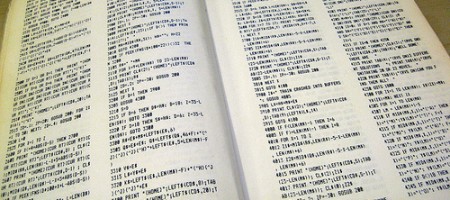[This is a talk I gave at Loyola University Chicago on November 8th, 2012.]
In January of this year, Stanley Fish published a series of online essays for The New York Times on digital humanities (this, then this, then this). To summarize: He doesn’t like it so much. And for those of us who like it a great deal, this was a curious mixture of good and bad news. It was bad news, because being publicly attacked by an extremely eminent public intellectual in the paper of record is a bit terrifying for scholars who already spend a good deal of time defending themselves in far less public venues. It was good news, though, because being attacked by a gray old man in the gray lady is exactly the sort thing that tends to set our vast network in motion. Despite our much vaunted newness, the digital humanities community, in its online form, resembles nothing so much as the scholarly discourse of forty or fifty years ago. Back then, it was not uncommon to see attacks and parries playing out across several numbers of a journal, as so-and-so offered a response to Professor so-and-so’s late comments on Hopkins’s use of accentual meter. The Republic of Posts tends to do exactly this when dh-ers all around the world are reading the same thing on the same day —– a phenomenon which happens very often online, and almost never off it. What’s more, Fish was naming names: friends of ours, books of ours, ideas we found compelling, and doctrines we held in common. Really, this was going to be ever so much fun.
But then he did something that ruined the whole thing for me in a stroke. In the midst of might Oedipal struggle, he called me “perhaps the most sophisticated theorist of the burgeoning field,” and proceeded to comment on my work at some length and with a good deal of charity. He doesn’t like what I’m saying either, really, but —– well, actually, it was hard to tell. He seemed to appreciate my work, or find it provocative…or something. Maybe he did like it?
“Damn it,” I thought, “What am I supposed to do now?” Suddenly, it seemed churlish to jump into the fray. I’ll admit to a certain guilty pleasure in having my work characterized by a famous scholar as “sophisticated” (even if I consider that statement absurd), but for the most part, I felt embarrassed by the whole thing. It would have been far easier to join those who had lately been skewered by the great Stanley Fish, because (as was obvious to everyone I know) they had all been treated unfairly. When this sort of thing happens, digital humanists tend to eschew the detached ironies of our more theory-obsessed forbears; our favorite rhetorical mode is something like righteous indignation tinged with self-deprecating humor. But I, having dodged a bullet in all of this, really had no cause for indignation of any kind. So in my flummoxed state, I decided to say nothing. I wrote a few tweets —– mostly in response to a torrent of good-natured ribbing from far-flung colleagues and friends —– and let the whole thing go on without me.
I’m already sounding a bit too grand and self-aborbed about all of this, so let me allay any fears you might have. I’m not about to give My Response to Stanley Fish. I’m not going provide some kind of witty (read, pompous) refutation of his arguments, defense of my friends’ arguments, or anything like that. I do, however, want to toss around a question that I have been thinking about for a long time, and which the Fish affair brought into sharp relief. Can you have computational text analysis and literary criticism at the same time? To get at that, we have to go a bit.
Back when I started being a digital humanist —– sometime in the mid-nineties —– almost everyone I knew in the then-as-now “burgeoning” field was interested in the World Wide Web. “Hypertext” was the bold and exciting term on everyone’s lips, and there was much effusive talk of a new democratization of scholarship. I was as enthusiastic about that as everyone else, but I had managed to become entirely enthralled with a much older form of geekery. I had fallen in love with programming languages, and like a hammer looking for a nail, I was casting around for ways to use that in the study of literature. That led me to the quite considerable (and already decades old) body of scholarship surrounding what was then called “computational stylometry.”
It’s important to remember that back then, text analysis had nothing of the sheen is has now. I hope I won’t offend anyone who might have participated in this pioneering phase by saying that the field of text analysis was, at that time, a bit of a backwater, even within the barely-noticed field of humanities computing. Not many people were doing this sort of thing, and the ones who were tended to form a very narrow, if passionate band of enthusiasts. Nonetheless, I think I can fairly say that I devoured every article written on the subject from Busa onward, and was completely enchanted by the whole thing.

